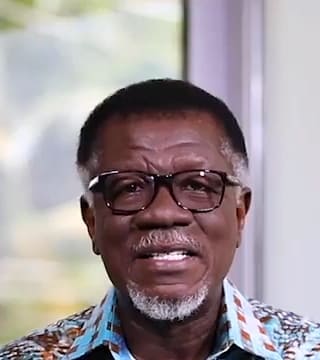Mensa Otabil - Seeking Help In The Wrong Places (09/30/2025)
Welcome to Where to Go. We’re still looking at the story of Naaman, and we are in chapter five of Second Kings, verse eight. So it was when Elisha, the man of God, heard that the king of Israel had torn his clothes that he sent to the king saying, «Why have you torn your clothes? Please let him come to me, that he shall know that there is a prophet in Israel.» When General Naaman reported a message of his to the king of Syria, the king of Syria did what kings do; he related his request to the king of Israel. At that time, he and the king of Israel were not on good terms.
So the king of Syria sent a delegation with gold, silver, nice clothes, and a team, along with a nicely couched letter to the king of Israel. The king of Syria’s letter was demanding that the king of Israel heal Naaman, and this is what it says: «I have sent Naaman, my servant, to you that you may heal him of his leprosy.» So this is an instruction: heal my servant.
When the king of Israel hears this instruction from the king of Syria, he is infuriated and tears his clothes apart. He interprets this as an act of provocation because he says, «Am I God, to kill and make alive, that this man sends a man to me to heal him of his leprosy? Therefore, please consider and see how he seeks a quarrel with me.»
So there is a diplomatic problem arising here because the king of Syria assumed that if there is someone who can heal his general in Israel, it must be the king. He sent a letter to the king. Many times when we are looking for help, we seek out the person who is the most powerful, with the highest title. We think if we can get right to the top, we will get the answer to our problem. But in this case, the man at the top was clueless. When he received the command to heal Naaman, he merely tore his clothes and was in distress. Many times life is like this; we go to people we think can help us, and they are totally unable to assist us. They are unaware that we expect them to help us because we think position is our help.
Our help is not in a position; it’s not in a title; it’s not in how far and how high someone has risen. Our help must always be in God Most High. He is higher than any title we can imagine. Elisha hears that the king of Israel is perplexed because of this letter. So, he sends a message to the king of Israel and says, «Mr. King, why have you torn your clothes? Why are you in distress? Don’t you know that there is a prophet in Israel? God’s own prophet in Israel sent the man over to me,» and that was very, very important because the message actually was not for the king of Israel; it was for Elisha. That’s what the maid had spoken about—not the king.
Sometimes we send our requests to the wrong people, and when they cannot solve it, we think, «Oh, this problem cannot be solved.» We believe, «If the big man can’t do it, then nobody can.» Who told you that? Who told you that if the big man can’t do it, there’s nothing bigger? There is a God, and He is bigger than every big man, every office holder, and every title holder. He is the God in whom we trust, and that is what Elisha told the king of Israel: God will heal this man; just bring him to me. That’s a proclamation.
Remember, although Elisha has been dead for all these years, the God of Elisha is still around, and He is still working miracles. He is still delivering; He is still rescuing. May your faith be made active today in the Lord God Most High.
Let’s pray. Say with me, «Heavenly Father, thank You that when I don’t know what to do, You know what to do. Manifest Your glory through me. In Jesus' name, amen and amen.» Well, I’ll be with you again. I’m Pastor Mensa Otabil. Shalom, peace, and life to you.

